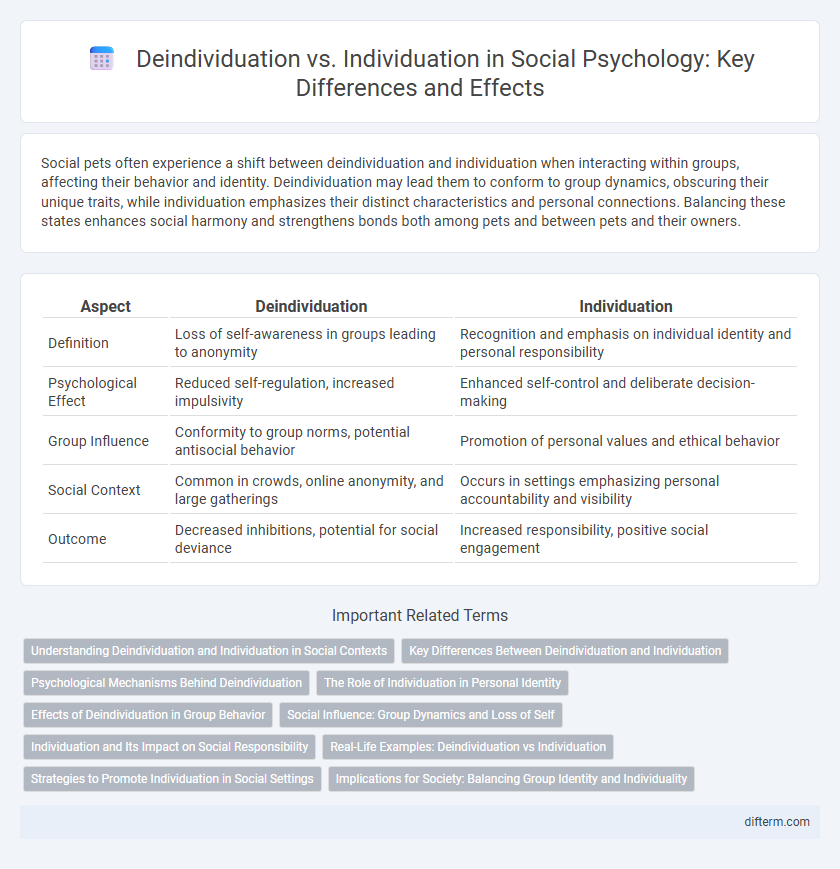Social pets often experience a shift between deindividuation and individuation when interacting within groups, affecting their behavior and identity. Deindividuation may lead them to conform to group dynamics, obscuring their unique traits, while individuation emphasizes their distinct characteristics and personal connections. Balancing these states enhances social harmony and strengthens bonds both among pets and between pets and their owners.
Table of Comparison
| Aspect | Deindividuation | Individuation |
|---|---|---|
| Definition | Loss of self-awareness in groups leading to anonymity | Recognition and emphasis on individual identity and personal responsibility |
| Psychological Effect | Reduced self-regulation, increased impulsivity | Enhanced self-control and deliberate decision-making |
| Group Influence | Conformity to group norms, potential antisocial behavior | Promotion of personal values and ethical behavior |
| Social Context | Common in crowds, online anonymity, and large gatherings | Occurs in settings emphasizing personal accountability and visibility |
| Outcome | Decreased inhibitions, potential for social deviance | Increased responsibility, positive social engagement |
Understanding Deindividuation and Individuation in Social Contexts
Deindividuation occurs in social contexts when individuals lose self-awareness and personal identity, often leading to impulsive and anti-normative behaviors. In contrast, individuation involves maintaining a strong sense of self and personal accountability, which fosters thoughtful decision-making and adherence to social norms. Understanding these processes is crucial for analyzing behaviors in crowds, online interactions, and group dynamics.
Key Differences Between Deindividuation and Individuation
Deindividuation involves a loss of self-awareness and lowered accountability in group settings, leading to impulsive and sometimes antisocial behavior. Individuation, in contrast, emphasizes self-awareness and personal accountability, fostering deliberate and socially responsible actions. Key differences include the psychological state of self-perception and the influence of social context on behavior regulation.
Psychological Mechanisms Behind Deindividuation
Deindividuation occurs when individuals in a group lose self-awareness and personal accountability, often leading to impulsive and antisocial behavior. Psychological mechanisms such as anonymity, diffusion of responsibility, and heightened arousal reduce self-regulation and increase susceptibility to group norms. These factors undermine individual identity, promoting conformity and diminished moral restraint in social settings.
The Role of Individuation in Personal Identity
Individuation plays a crucial role in shaping personal identity by emphasizing unique traits and self-awareness that distinguish individuals within social contexts. This process counters deindividuation, which often leads to loss of self-regulation and anonymity in crowds or group settings. Strengthening individuation supports personal accountability, fosters authentic expression, and maintains distinctiveness essential for psychological well-being.
Effects of Deindividuation in Group Behavior
Deindividuation in group behavior results in diminished self-awareness and weakened personal accountability, often leading to increased impulsivity and antisocial actions. This psychological state fosters conformity to group norms, which can escalate behaviors such as aggression, vandalism, or risk-taking, especially in large crowds or online environments. Research in social psychology highlights that factors like anonymity, group size, and arousal intensify deindividuation effects, reducing individual restraint and promoting collective behavior that diverges from personal values.
Social Influence: Group Dynamics and Loss of Self
Deindividuation occurs when individuals in groups experience a diminished sense of self-awareness and personal responsibility, often leading to increased conformity to group norms and impulsive behaviors. This phenomenon contrasts with individuation, where individuals maintain self-awareness and autonomy, resisting social pressures and groupthink. Social influence plays a critical role in this dynamic, as group size, anonymity, and arousal can intensify deindividuation, resulting in a loss of self and altered behavior within social settings.
Individuation and Its Impact on Social Responsibility
Individuation enhances social responsibility by fostering self-awareness and accountability, encouraging individuals to recognize the consequences of their actions within a group. When people maintain a distinct sense of identity, they are more likely to adhere to social norms and ethical standards, reducing the likelihood of antisocial behavior. Psychological research shows that heightened individuation correlates with increased prosocial behaviors, promoting cooperation and community well-being.
Real-Life Examples: Deindividuation vs Individuation
Deindividuation often occurs in large crowds, such as during protests or concerts, where individuals may engage in behaviors they typically avoid due to anonymity and group influence, like vandalism or reckless conduct. Conversely, individuation is evident in workplace settings or support groups where personal accountability and self-awareness lead to more responsible and ethical behavior. These real-life contexts highlight how social environments shape whether people conform to group norms or adhere to their personal values.
Strategies to Promote Individuation in Social Settings
Promoting individuation in social settings involves encouraging self-awareness and personal responsibility through techniques such as reflective journaling and mindfulness practices. Implementing small group discussions and personalized feedback fosters recognition of individual contributions, countering the anonymity that leads to deindividuation. Creating environments that highlight unique identities, like using name tags and personal storytelling, further reinforces a sense of individuality within collective groups.
Implications for Society: Balancing Group Identity and Individuality
Deindividuation can lead to reduced self-awareness and increased conformity within groups, often resulting in impulsive or antisocial behavior. In contrast, individuation promotes self-reflection and personal accountability, fostering diversity and innovation in social settings. Balancing group identity with individuality is essential for cultivating harmonious communities that encourage both collective cooperation and personal expression.
deindividuation vs individuation Infographic

 difterm.com
difterm.com